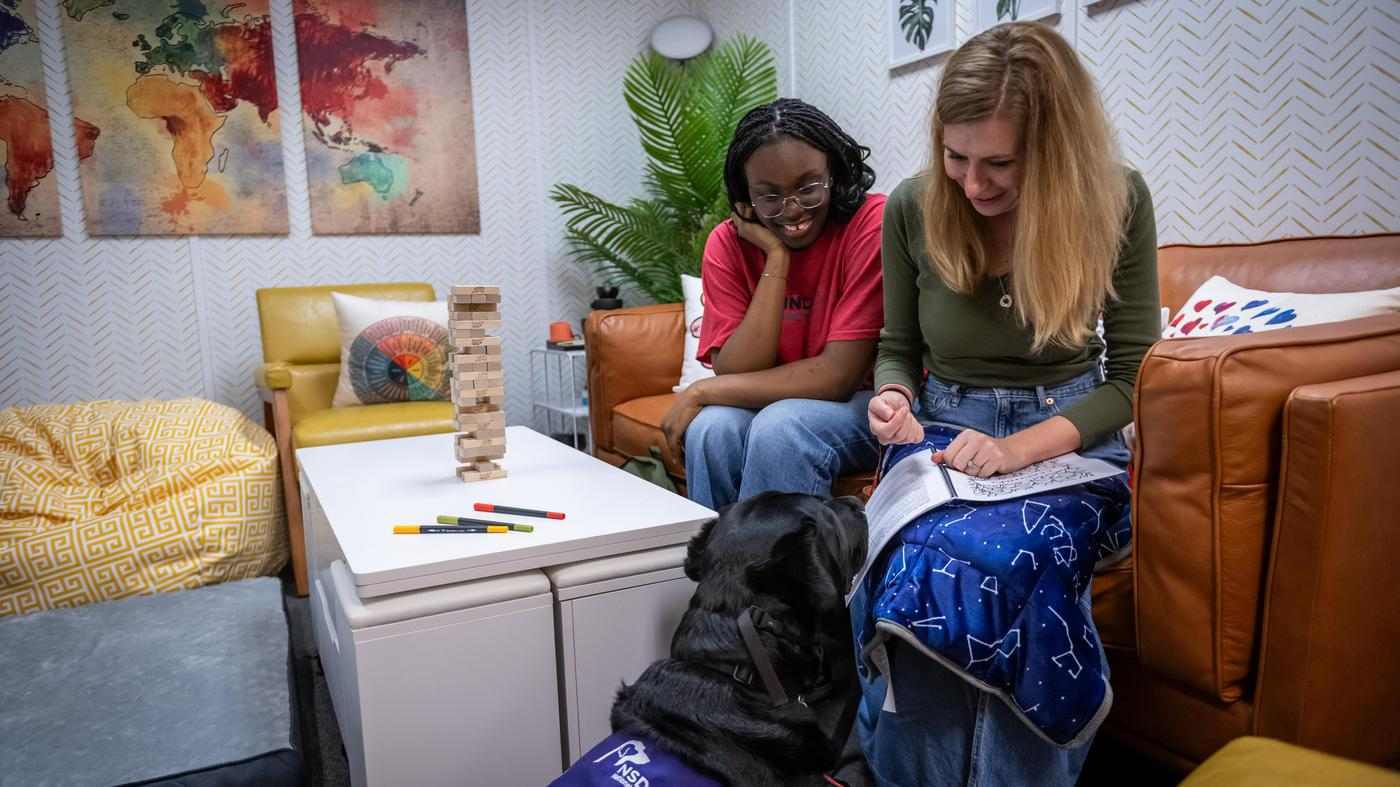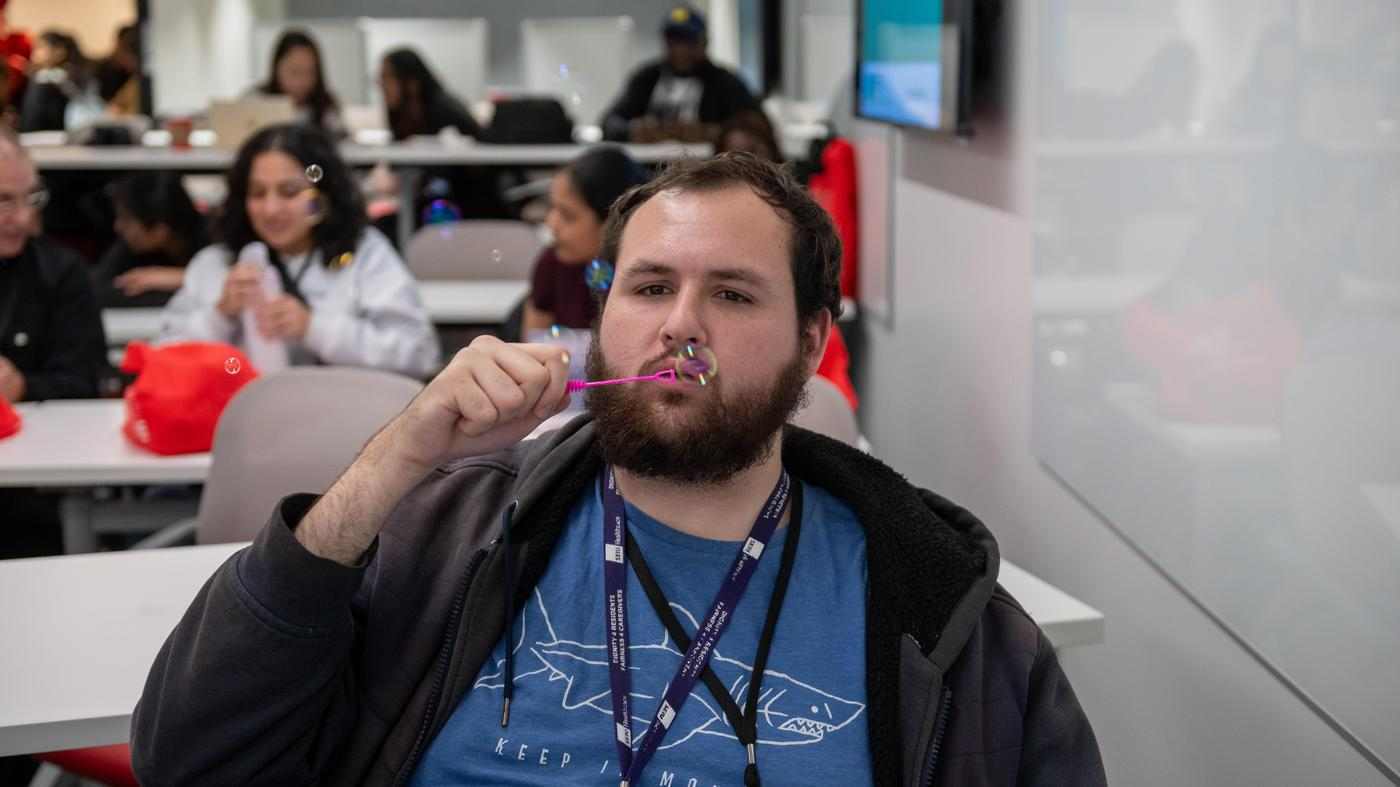At Fanshawe, innovation in education isn’t just about adopting the latest technology. It’s about creating meaningful change for our students and the communities we serve. Below are five powerful examples of how we’re putting this commitment into action.
1. Student Sensory Spaces
Photo Credit: Keon Bahrabadi, Photography, ’25
Recognizing the need for inclusive and neurodiversity-affirming environments, Fanshawe’s Counselling and Accessibility Services team, in partnership with the Student Wellness Centre, transformed two existing nap rooms into customizable sensory spaces designed with input from students themselves. These rooms—one tailored for sensory-seeking and the other for sensory-avoidant needs—offer a safe haven for emotional regulation and respite. Since launching, they’ve become a refuge not only for students with disabilities but for anyone in need of a moment of calm, illustrating how thoughtful design can foster community-wide wellness.
Julie Knights-Thomson, counsellor and project lead, says, “The rooms look great! It was a lot of fun to set them up and we are excited to see them in use.”
One student who used a sensory space said, “I didn’t want to leave the room. I felt so calm and could have stayed all day.”
2. Doing Deathcare Differently
In a bold and compassionate step forward, our "Doing Deathcare Differently" project is enhancing community-based palliative care by integrating end-of-life doulas into the health-care system. The initiative includes campus-wide surveys on death literacy and anxiety, a workshop for faculty members and external research partners from the United Kingdom called No Barriers Here, and upcoming community conversations about how we support people at life’s end. Our Fanshawe faculty who attended the No Barriers Here training are the only trained facilitators in an academic institution in Canada. This training will leverage research activities and benefit from the evidence-informed methodology developed by the UK team.
With support from recent graduates and ongoing collaboration, this project is sparking critical dialogue and expanding educational pathways in a traditionally underexplored area of care.
A Fanshawe co-op student created a highlight reel showcasing the research activities:
3. Closing the Loop on Plastic Waste Recycling
Faculty at Fanshawe’s St. Thomas/Elgin Regional Campus developed a new recycling initiative to tackle the urgent issue of plastic waste and its effects on the environment. The “shred, make, use, repeat” program turns plastic waste into raw materials for 3D printing, thanks to a custom-built shredder and extruder system developed by our own teams. This closed-loop model—among the first of its kind in Canadian post-secondary education—proves how innovation in education can lead to sustainable solutions with real-world impact.
4. The Kind Space
Launched as an initiative co-designed with students, The Kind Space is a physical and emotional hub where peers support peers through drop-ins, wellness activities, and facilitated group sessions. From body doubling study groups to conversations about mindful living (often co-led with Counselling and Accessibility Services’ facility dog, Heartly), this warm and welcoming space has supported over 300 unique student interactions in a single term. Students had the opportunity to find calm in The Kind Space, have a tea or a snack, learn about various college and community resources, and participate in various wellness activities like chess, artwork, and listening to music. More than a room, The Kind Space reflects the power of student-led care, connection, and community.
Nikki Ross, project lead on The Kind Space, says, “Seeing the Kind Space come to life has been incredible to witness. Students from all over the College with a diversity of lived experiences come together to connect, learn, share wisdom, and create community. It’s these community spaces that promote inclusion, curiosity, and of course, kindness. I am so grateful that students have this space now.”
5. Lending Paper Documents in a Digital Age
To ensure that all students studying at any of Fanshawe’s campuses have equitable access to learning resources, Fanshawe is exploring the implementation of Controlled Digital Lending (CDL). This innovative approach would allow students to borrow a digital version of a library book if its physical counterpart is unavailable to them, and vice versa, helping bridge the access gap for remote learners. With research underway, CDL could soon become a model of modern library access for innovative colleges everywhere.
As Wilson Poulter, project lead, shares, the goal of digital lending is “to improve our freedom to read and learn, wherever you are in the world.”
Innovation Village, and its creative spaces and technology, help make many of the above initiatives possible. Learn more about the facilities at Fanshawe’s Innovation Village.









